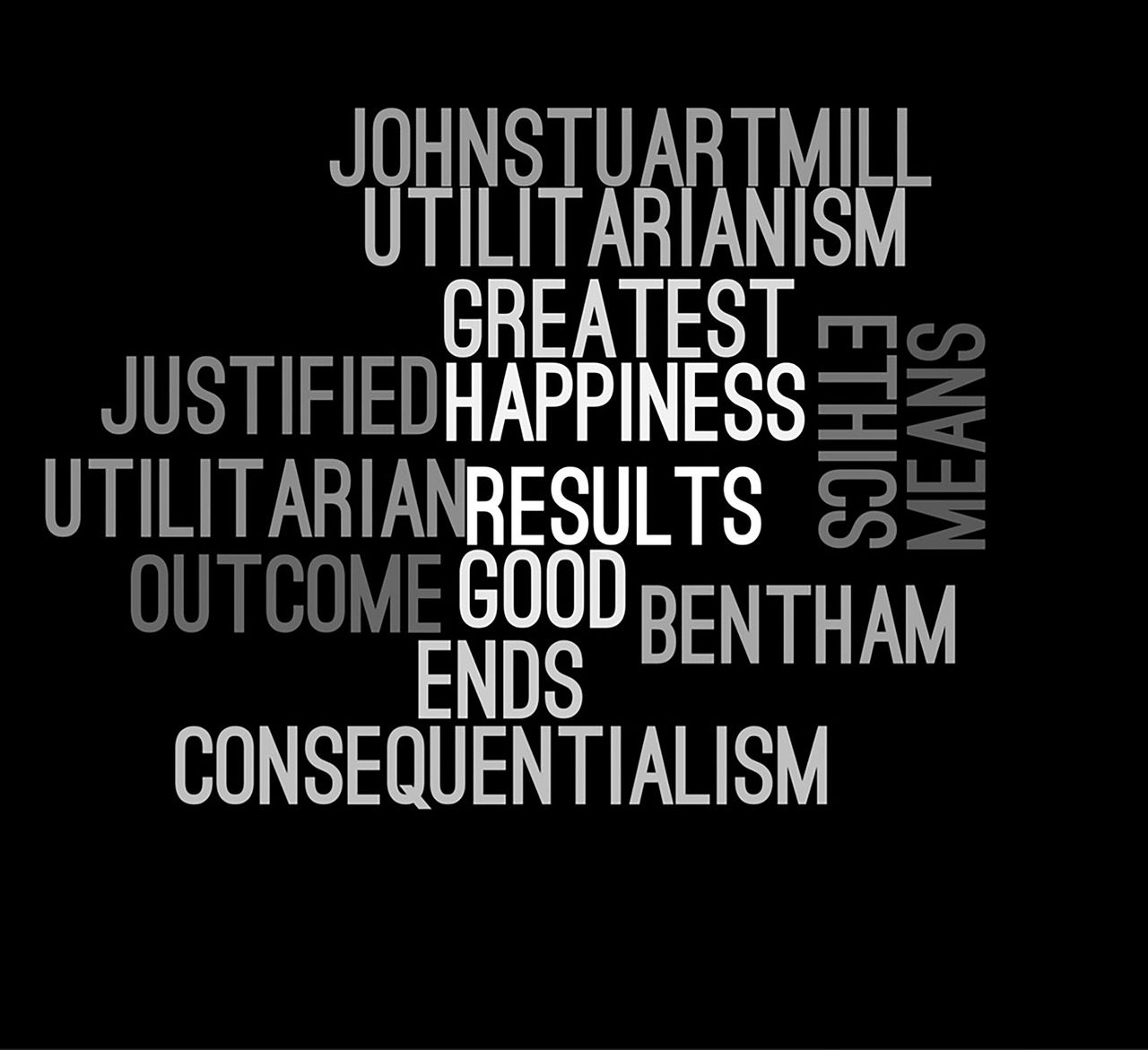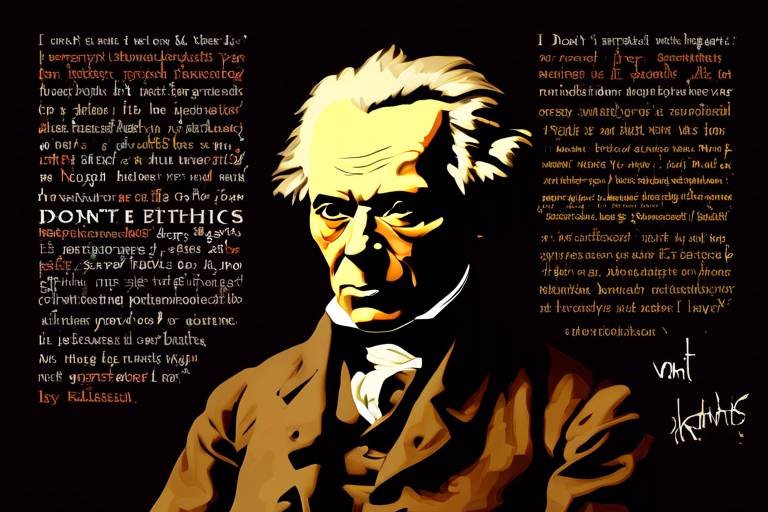An Examination of Kant's Ethics
Kantian ethics is a fascinating and profound area of moral philosophy that challenges us to think deeply about our duties and the principles that guide our actions. At its core, this ethical framework, established by the German philosopher Immanuel Kant, revolves around the concept of duty and the moral law that governs our behavior. Kant believed that morality is not simply a matter of personal preference or societal norms; instead, it is grounded in reason and the autonomy of individuals. This article aims to unpack the fundamental principles of Kant's ethics, exploring its key concepts, implications, and criticisms, while providing a comprehensive understanding of its significance in contemporary moral philosophy.
In the realm of ethics, Kantian philosophy stands out as a beacon of rational thought. Kant posited that our moral duties are dictated by rationality and the inherent dignity of human beings. This means that when we make ethical decisions, we should do so based on reasoned principles rather than emotional impulses or external pressures. Kant's emphasis on autonomy—the idea that individuals are capable of self-governance—plays a crucial role in his moral philosophy. He argued that true moral actions arise when we act out of a sense of duty, guided by universal moral laws that apply to everyone, regardless of personal circumstances.
At the heart of Kant's moral philosophy is the Categorical Imperative, a principle that serves as a universal guide for ethical behavior. Unlike hypothetical imperatives, which are conditional and depend on personal desires, the Categorical Imperative commands us to act according to maxims that can be universally applied. This means that before we take any action, we should ask ourselves whether we could will that our action become a universal law. The significance of this principle lies in its ability to promote consistency and fairness in moral judgments, ensuring that we treat others as we would want to be treated ourselves.
Kant presents multiple formulations of the Categorical Imperative, each shedding light on different aspects of ethical reasoning. The two most notable formulations are the principle of universality and the principle of humanity. Each of these formulations plays a crucial role in guiding our moral decisions and ensuring that we respect the inherent worth of all individuals.
The principle of universality requires that our actions could be applied consistently across all rational beings. In other words, if we believe that a particular action is morally acceptable, we must be willing to accept that everyone else could also perform that action without leading to contradictions or moral chaos. This principle fosters ethical consistency and challenges us to consider the broader implications of our actions. For instance, if we justify lying in one situation, we must confront the reality that lying could become a universal practice, undermining trust and communication in society.
On the other hand, the principle of humanity emphasizes the importance of treating individuals as ends in themselves, rather than merely as means to an end. This principle insists on respecting the intrinsic value of every person, acknowledging their capacity for rational thought and moral agency. By adhering to this principle, we foster a culture of respect and dignity, recognizing that every individual has their own goals, aspirations, and rights. This notion is particularly relevant in discussions around human rights and social justice, where the moral worth of individuals must be upheld against utilitarian calculations that might prioritize the greater good over individual rights.
Another cornerstone of Kant's ethics is the concept of autonomy, which signifies our ability to make rational moral choices free from external influences. In Kant's view, moral agency is tied to our capacity to legislate moral laws for ourselves, guided by reason. This idea empowers individuals to take responsibility for their actions, reinforcing the notion that we are not merely products of our environment or circumstances. Instead, we are active participants in our moral lives, capable of discerning right from wrong and acting accordingly.
Despite its profound insights, Kantian ethics is not without its critiques. Some philosophers argue that the rigid structure of Kant's moral system can be overly dogmatic, leaving little room for the complexities of real-life moral dilemmas. For instance, what happens when two categorical imperatives conflict? This rigidity can lead to challenging situations where moral agents are left grappling with difficult choices.
Critics often point out that Kant's ethical system can come across as absolutist, demanding adherence to moral laws regardless of the consequences. This can create tension in scenarios where following a categorical imperative might lead to harm or injustice. For example, if telling the truth could endanger someone's life, the strict application of the principle may seem inadequate in addressing the nuances of such a situation.
Another significant critique centers on Kant's dismissal of emotions in moral reasoning. While he emphasized the importance of rationality, critics argue that this perspective overlooks the complexities of human moral experience. Emotions often play a critical role in our ethical decision-making, influencing our empathy, compassion, and understanding of others. By sidelining emotions, Kantian ethics may fall short in capturing the richness of human relationships and the moral dynamics at play within them.
Despite these critiques, Kant's ethical theories continue to resonate in modern moral philosophy. His ideas about autonomy, dignity, and universal moral principles are foundational to contemporary debates surrounding ethics, human rights, and social justice. As we navigate the complexities of modern life, Kant's emphasis on rationality and moral law serves as a guiding light, encouraging us to engage in ethical reasoning that respects the inherent worth of every individual. His legacy endures, prompting us to reflect on our moral responsibilities in an increasingly interconnected world.
- What is the main idea of Kantian ethics?
Kantian ethics focuses on the concept of duty and the moral law, emphasizing that moral actions must be guided by reason and the autonomy of individuals.
- What is the Categorical Imperative?
The Categorical Imperative is a fundamental principle in Kant's philosophy that commands us to act according to maxims that could be universally applied.
- How does Kant view emotions in moral decision-making?
Kant tends to downplay the role of emotions, arguing that moral reasoning should be based on rationality rather than feelings, which critics argue is a limitation of his ethics.
- Why is Kant's ethics still relevant today?
Kant's ideas about autonomy, dignity, and universal moral principles continue to influence discussions on ethics, human rights, and social justice in contemporary society.

Introduction to Kantian Ethics
Kantian ethics is a fascinating and profound approach to morality that places reason and autonomy at the forefront of ethical decision-making. Imagine standing at a crossroads, where each path represents a different moral choice. In this scenario, Kant argues that it is our duty to choose the path guided by rational thought rather than mere desire or inclination. This ethical framework is built upon the idea that moral laws are not arbitrary but are grounded in reason itself. Kant believed that true morality arises when individuals act out of a sense of duty, adhering to principles that can be universally applied.
At its core, Kantian ethics emphasizes the importance of the Categorical Imperative, a central tenet that serves as a universal moral law. This principle urges us to consider whether the maxim behind our actions could be willed as a universal law applicable to everyone. For instance, if you consider lying to get out of a difficult situation, the Categorical Imperative prompts you to ask: "What if everyone lied in similar circumstances?" This self-reflective question highlights the need for consistency and universality in moral reasoning.
Furthermore, Kantian ethics champions the idea of autonomy, which is the capacity of rational agents to legislate moral laws for themselves. This autonomy is not merely about freedom of choice; it's about making choices based on rational deliberation. Kant believed that every individual has intrinsic worth and should never be treated merely as a means to an end. This respect for human dignity is a cornerstone of Kant's moral philosophy, making it a compelling framework for evaluating ethical dilemmas.
In a world often clouded by subjective moral interpretations, Kant's insistence on objective moral truths provides a refreshing perspective. It invites us to engage in critical thinking about our actions and their implications for society as a whole. As we navigate the complexities of contemporary moral issues, understanding Kantian ethics can offer valuable insights into our responsibilities as moral agents. In the following sections, we will explore the Categorical Imperative in depth, examining its formulations and implications for ethical reasoning.

The Categorical Imperative
The Categorical Imperative is not just a fancy term thrown around in philosophical circles; it is the very cornerstone of Kantian ethics. Imagine a moral compass that points true north regardless of the situation—this is what Kant aimed to achieve with his formulation. Unlike hypothetical imperatives, which depend on personal desires and goals, the Categorical Imperative demands that we act according to principles that can be universally applied. In simpler terms, if you're considering an action, ask yourself: "What if everyone did this?" If the answer leads to chaos or inconsistency, then it’s likely a moral misstep. This approach emphasizes the importance of reason and the moral law that governs our actions.
Kant articulated the Categorical Imperative in several formulations, each shedding light on different aspects of moral reasoning. The first formulation, known as the principle of universality, invites us to consider whether our actions could be made into a universal law. This means that before acting, we should evaluate whether we would be comfortable with everyone else behaving in the same way. For instance, if you think it’s acceptable to lie to get out of a difficult situation, you must recognize that if everyone lied, trust would disintegrate, making communication and relationships impossible.
The second formulation, the principle of humanity, takes this a step further by emphasizing the intrinsic worth of individuals. According to Kant, we should treat people as ends in themselves, not merely as means to an end. This principle fosters a profound respect for human dignity. For example, if you’re in a position of power and consider using someone for your own gain, the principle of humanity would remind you that this person has their own goals, desires, and rights. By recognizing their worth, you are compelled to act with integrity and respect.
To illustrate these formulations, let’s summarize them in a simple table:
| Formulation | Description |
|---|---|
| Principle of Universality | Act only according to that maxim whereby you can, at the same time, will that it should become a universal law. |
| Principle of Humanity | Act in such a way that you treat humanity, whether in your own person or in the person of any other, always at the same time as an end and never merely as a means to an end. |
These formulations serve as a guide, illuminating our path in the often murky waters of ethical decision-making. They compel us to reflect deeply on our motivations and the potential consequences of our actions. In a world filled with gray areas, Kant’s Categorical Imperative offers a framework that encourages clarity and consistency. It reminds us that morality is not just about personal gain or societal approval but about adhering to principles that uplift humanity as a whole.
As we navigate our daily lives, the Categorical Imperative urges us to engage in a dialogue with ourselves. Are we honoring our duties? Are we respecting the autonomy of others? By embracing this ethical framework, we can strive to create a more just and equitable society. In essence, Kant’s Categorical Imperative is a call to action—a challenge to live our lives with integrity and purpose.
- What is the Categorical Imperative?
The Categorical Imperative is a central concept in Kantian ethics that serves as a universal moral law guiding our actions.
- How does the Categorical Imperative differ from hypothetical imperatives?
Unlike hypothetical imperatives, which are conditional and depend on personal desires, the Categorical Imperative applies universally and unconditionally.
- Why is the principle of humanity important?
The principle of humanity emphasizes treating individuals with respect and dignity, recognizing their intrinsic worth.

Formulations of the Categorical Imperative
At the core of Kant's ethical philosophy lies the Categorical Imperative, a principle that serves as a guiding light for moral decision-making. Kant offers several formulations of this imperative, each providing unique insights into how we should act. The first and perhaps the most well-known formulation is the principle of universality, which posits that one should act only according to that maxim which they can will to become a universal law. This means that before taking an action, one should consider whether they would want everyone else to act in the same way. Imagine if everyone decided to lie; trust would erode, and communication would falter. Thus, the principle pushes us to think beyond ourselves and consider the broader implications of our actions.
Another significant formulation is the principle of humanity, which emphasizes the inherent dignity of each individual. According to this principle, we must treat others as ends in themselves, never merely as means to an end. This is a powerful reminder of the value of human life and the importance of respecting others' autonomy. For example, if you were to use someone solely for your benefit—say, in a business deal—without considering their needs or desires, you would be violating this principle. It’s like using a tool without appreciating its craftsmanship; you miss the essence of what it means to be human.
Kant's formulations serve as a framework for ethical reasoning, encouraging individuals to engage in deep reflection about their choices. The interplay between these principles creates a robust moral compass that can guide us through complex ethical landscapes. To better understand the formulations, consider the following table that summarizes their key aspects:
| Formulation | Description |
|---|---|
| Principle of Universality | Act only according to that maxim which you can will to become a universal law. |
| Principle of Humanity | Act in such a way that you treat humanity, whether in your own person or in the person of any other, always at the same time as an end and never merely as a means to an end. |
By applying these formulations in our daily lives, we can cultivate a deeper understanding of our ethical responsibilities. Kantian ethics challenges us to rise above our immediate desires and consider the broader impact of our actions on society. It’s not just about what feels right in the moment; it’s about what is universally right for all rational beings. This emphasis on rationality and moral duty is what sets Kant apart in the realm of ethical philosophy, making his ideas both timeless and relevant today.
As we navigate the complexities of modern life, the Categorical Imperative remains a valuable tool for ethical reasoning. It prompts us to ask critical questions: Are my actions justifiable? Would I want everyone to act this way? In a world where moral relativism often reigns, Kant's formulations offer a steadfast approach to navigating ethical dilemmas.

Principle of Universality
The is one of the cornerstones of Kantian ethics, acting as a litmus test for moral actions. At its core, this principle posits that an action is morally right if it can be universally applied to all rational beings without contradiction. Imagine if everyone in the world acted in the same way you did; would it lead to a harmonious society or chaos? This thought experiment is crucial in understanding Kant's ethical framework. It encourages individuals to step outside their personal circumstances and consider the broader implications of their actions.
Kant believed that for a moral action to hold true, it must be applicable to everyone under similar conditions. This means that if you decide to break a promise, you must be prepared to accept that everyone else should also break promises when it suits them. The principle of universality thus demands a level of consistency in moral reasoning, urging us to think about the potential consequences of our actions on a global scale. This does not merely imply a mechanical application of rules; rather, it requires a deep engagement with the fabric of moral law.
To further illustrate the significance of the Principle of Universality, consider the following scenarios:
- Scenario 1: If lying is permissible, then universalizing this action would mean that everyone could lie. This would erode trust, making communication meaningless.
- Scenario 2: If stealing is acceptable, then universalizing it would lead to a world where property rights are non-existent, resulting in chaos.
Through these examples, it becomes clear that the Principle of Universality is not just a theoretical construct; it has practical implications for how we navigate our ethical lives. It serves as a guide to ensure that our actions contribute positively to society rather than detract from it. By adhering to this principle, individuals are encouraged to act in ways that respect the rights and dignity of others, fostering a community grounded in mutual respect.
In the realm of moral philosophy, the Principle of Universality challenges us to transcend our personal biases and consider the collective good. It asks us to reflect on the kind of world we want to create. Are we willing to uphold the values that promote fairness and justice, or do we prioritize our own interests at the expense of others? Ultimately, this principle invites us to engage in a dialogue about our moral responsibilities and the impact of our choices on the lives of others.
- What is the Principle of Universality?
The Principle of Universality is a fundamental concept in Kantian ethics that states an action is morally right if it can be applied universally to all rational beings without contradiction.
- How does the Principle of Universality influence moral decision-making?
This principle encourages individuals to consider the broader impact of their actions, ensuring that they act in ways that can be accepted by all, fostering ethical consistency.
- Can the Principle of Universality be applied to modern ethical dilemmas?
Yes, it provides a framework for evaluating contemporary moral issues, compelling us to consider how our decisions affect society as a whole.

Principle of Humanity
The is one of the cornerstones of Kantian ethics, emphasizing that every individual should be treated as an end in themselves, not merely as a means to an end. This principle is a profound assertion of human dignity and moral worth, urging us to recognize the intrinsic value of every person. Imagine for a moment a world where each individual is seen as a mere tool for someone else's gain; it would be a bleak and dehumanizing existence. Kant's ethical framework stands in stark contrast to this notion, advocating for a moral landscape where respect for each person's autonomy is paramount.
At its core, the Principle of Humanity challenges us to consider the implications of our actions on others. When making decisions, we should ask ourselves: "Does this action respect the dignity of the individuals involved?" This reflective process is crucial in ensuring that our moral choices align with the fundamental respect owed to every human being. Kant believed that moral actions must be guided by reason, which enables us to recognize the rights and worth of others, thus fostering an ethical community where individuals can thrive.
Furthermore, the Principle of Humanity encourages us to cultivate empathy and understanding in our interactions. It reminds us that behind every decision, there is a person with feelings, aspirations, and rights. This perspective not only enhances our moral reasoning but also enriches our relationships with others. In practical terms, this means:
- Valuing the opinions and feelings of others in discussions.
- Considering the long-term effects of our actions on individuals and communities.
- Striving to uplift and support those around us, acknowledging their inherent worth.
In contemporary discussions about ethics, the Principle of Humanity remains relevant, especially in debates surrounding human rights, social justice, and moral responsibility. It serves as a guiding light in our quest for a just society, where the rights of individuals are upheld and celebrated. By adhering to this principle, we not only honor the legacy of Kantian ethics but also contribute to a world where respect, dignity, and moral worth are paramount.
In summary, the Principle of Humanity is a powerful reminder that ethics is not just about rules and regulations; it’s about recognizing the inherent value of every person. It invites us to engage with the world thoughtfully and compassionately, ensuring that our actions reflect a deep respect for human dignity. As we navigate the complexities of modern life, let us hold this principle close, guiding our moral compass toward a future where everyone is treated as an end in themselves.
- What is the Principle of Humanity in Kantian ethics?
This principle asserts that individuals must be treated as ends in themselves and not merely as means to achieve something else. - How does the Principle of Humanity relate to human rights?
It underpins the concept of human rights by emphasizing the intrinsic worth of every individual and their right to be treated with dignity. - Can the Principle of Humanity be applied in everyday decision-making?
Absolutely! It encourages us to consider how our actions affect others and to make choices that respect their dignity and autonomy.

Autonomy and Moral Agency
Autonomy is a cornerstone of Kantian ethics, representing the capacity of individuals to make rational and independent moral choices. Kant believed that true moral agency arises when individuals act out of a sense of duty rather than mere inclination or external pressure. This notion of autonomy is not just about freedom; it’s about the ability to govern oneself according to rational principles. Imagine a ship navigating through a storm; it is the captain's autonomy—his ability to steer the ship—that determines its course. In the same way, our moral decisions are guided by our rational capacities, allowing us to navigate the complex waters of ethical dilemmas.
In Kant’s view, moral agents are those who can recognize the moral law and act according to it. This recognition requires a level of self-governance that transcends mere obedience to rules. It's about understanding why a particular action is right or wrong and choosing to act accordingly. For instance, when faced with the choice of lying to protect a friend, a morally autonomous individual would weigh the implications of that lie against the universal moral law, ultimately choosing to uphold honesty because it respects the inherent dignity of all individuals involved.
The significance of autonomy in Kantian ethics extends beyond individual decision-making. It also emphasizes the importance of respecting others as autonomous beings. This mutual respect forms the bedrock of moral interactions. When we acknowledge the autonomy of others, we treat them as ends in themselves, not merely as means to an end. This principle fosters a society where individuals are empowered to make their own choices, leading to a more just and equitable world.
However, the concept of autonomy is not without its challenges. Critics often argue that Kant’s emphasis on rationality overlooks the emotional and relational aspects of human experience. While Kant champions the idea that reason should guide our moral decisions, life often presents scenarios where emotions play a significant role. For example, a parent may feel compelled to act in a way that prioritizes their child's immediate happiness over strict adherence to moral law. In such cases, the tension between emotional instincts and rational duty raises important questions about the nature of moral agency.
To better understand the relationship between autonomy and moral agency, it can be helpful to consider the following key points:
- Rational Decision-Making: Autonomy allows individuals to make decisions based on reason rather than external influences.
- Mutual Respect: Acknowledging the autonomy of others leads to respectful and ethical interactions.
- Balancing Emotions and Reason: While autonomy emphasizes rationality, it is essential to recognize the role of emotions in moral decision-making.
In conclusion, autonomy is not just a theoretical concept in Kantian ethics; it is a practical framework that guides our moral lives. By embracing our autonomy and respecting the autonomy of others, we can cultivate a more ethical society where individuals are empowered to make choices that reflect their rational understanding of moral law.
Q1: What is autonomy in Kantian ethics?
A1: Autonomy refers to the capacity of individuals to make rational and independent moral choices, guided by their understanding of moral law.
Q2: How does autonomy relate to moral agency?
A2: Autonomy is essential for moral agency, as it allows individuals to govern their actions according to rational principles, rather than external pressures or inclinations.
Q3: Can emotions influence moral decision-making in Kantian ethics?
A3: While Kant emphasizes rationality, critics argue that emotions play a significant role in moral decision-making, creating a tension between emotional instincts and rational duty.

Critiques of Kantian Ethics
Kantian ethics, while foundational in moral philosophy, is not without its share of critiques. Many philosophers and ethicists have raised concerns about the rigid structures and absolutist nature of Kant's moral framework. One primary critique revolves around the idea that Kant's ethical system can be overly stringent, leaving little room for the complexities of real-life moral dilemmas. For instance, imagine a situation where telling the truth could lead to significant harm. Kant's categorical imperative would insist on honesty, but does this rigid adherence to duty truly reflect moral reality? Critics argue that such inflexibility can result in morally questionable outcomes.
Moreover, another significant critique focuses on Kant's dismissal of emotions in moral reasoning. Kant argues that moral decisions should be based on rationality and duty rather than feelings or emotional responses. While this approach promotes a sense of objectivity, it may also overlook the rich tapestry of human experience. Emotions often play a crucial role in our moral decision-making processes. For instance, when faced with a dilemma, it's not just logic that guides us; our feelings of empathy, love, or even anger can influence our choices. By sidelining emotions, Kantian ethics risks presenting a cold, detached view of morality that may not resonate with the way humans actually navigate ethical challenges.
In addition to these critiques, some philosophers point out that Kant's ethical framework may struggle with moral dilemmas that pit two categorical imperatives against each other. For example, consider the classic trolley problem: should one pull a lever to redirect a runaway trolley, sacrificing one person to save five? Kantian ethics would struggle here, as both options could be framed as fulfilling a duty, yet they lead to vastly different outcomes. This highlights a potential flaw in Kant's system: its inability to provide clear guidance in situations where moral duties conflict.
Furthermore, the principle of universality, which is a cornerstone of Kant's moral philosophy, raises questions about its practical application. While it aims to create a universal moral law applicable to all rational beings, critics argue that it can lead to absurd conclusions. What happens when a universally applicable maxim conflicts with cultural or situational nuances? The rigidity of this principle can sometimes ignore the context in which moral decisions are made, potentially leading to decisions that feel unjust or inappropriate in specific circumstances.
Despite these critiques, it is essential to recognize that Kant's ethics has significantly shaped contemporary moral philosophy. The discussions surrounding its limitations have led to the development of more nuanced ethical theories that strive to balance duty with the complexities of human emotions and relationships. As we reflect on Kantian ethics, it becomes evident that while it offers a robust framework for understanding morality, it also prompts us to consider the broader spectrum of human experiences in ethical decision-making.
- What is the main critique of Kantian ethics? The primary critiques focus on its rigidity and the dismissal of emotions in moral reasoning.
- How does Kant's principle of universality pose a problem? It can lead to absurd conclusions when applied without considering cultural or situational contexts.
- Can Kantian ethics handle moral dilemmas effectively? Critics argue that it struggles with dilemmas where categorical imperatives conflict, leading to unclear moral guidance.

Rigidity and Absolutism
Kant's ethical framework, while groundbreaking, is often criticized for its rigidity and absolutism. At the heart of this critique lies the idea that Kant's moral principles are inflexible and do not allow for exceptions. Imagine a strict rulebook that applies to everyone, regardless of the situation. This is essentially how critics view Kant's categorical imperatives. They argue that in the real world, moral dilemmas are rarely black and white. There are shades of gray that require a nuanced approach to ethics.
For instance, consider a scenario where you must lie to protect someone’s life. According to Kantian ethics, lying is inherently wrong, as it violates the categorical imperative. However, many would argue that in this case, lying could be the more ethical choice. This brings us to a fundamental question: Should moral laws be absolute, or should they allow for exceptions based on context? Critics assert that Kant's system fails to account for such complexities, leading to moral conclusions that can feel detached from human experience.
Moreover, the rigidity of Kant's ethics can lead to moral dilemmas that seem to pit one categorical imperative against another. For example, if one must choose between telling the truth and saving a life, the strict adherence to duty can result in outcomes that many would find morally unacceptable. This is where the absolutist nature of Kant's ethics can be particularly troubling. It raises the issue of whether moral laws should be adaptable.
To illustrate this point further, let's consider a comparison table that summarizes the rigidity of Kantian ethics against more flexible ethical theories like utilitarianism:
| Aspect | Kantian Ethics | Utilitarianism |
|---|---|---|
| Flexibility | Rigid, absolute rules | Context-dependent, adaptable |
| Moral Decision Making | Duty-based | Outcome-based |
| Handling Dilemmas | Strict adherence to rules | Weighing consequences |
In summary, while Kant's ethics offers a robust framework for understanding morality, its rigidity and absolutism can lead to challenges in real-world applications. The inability to adapt to complex moral situations leaves many feeling that Kantian ethics, while noble in its intentions, may not always provide the most practical guidance for moral decision-making. As we continue to explore the implications of Kant's philosophy, it is essential to ask ourselves whether strict adherence to duty is truly the best path to ethical living.
Frequently Asked Questions
- What is the main criticism of Kantian ethics? The primary criticism is its rigidity, as it does not allow for exceptions in moral decision-making.
- How does Kant's ethics handle moral dilemmas? Kantian ethics often struggles with moral dilemmas because it requires adherence to categorical imperatives, which can conflict with one another.
- Is there a more flexible alternative to Kantian ethics? Yes, utilitarianism is often seen as a more flexible alternative, focusing on the outcomes of actions rather than strict adherence to rules.

Neglect of Emotions
Kant's ethical framework, while robust and influential, has faced criticism for its apparent in moral reasoning. This is a significant point of contention because, let's face it, emotions are a fundamental part of the human experience. When we make decisions, especially moral ones, our feelings often play a crucial role. Kant, however, viewed emotions with a degree of skepticism, arguing that they could cloud our judgment and lead us away from rationality. But can we really separate our emotions from our ethical decisions?
To illustrate this, consider a situation where you must choose between telling a harsh truth or a comforting lie. Kant would likely advocate for the truth, as it aligns with the moral law. But what if that truth causes significant emotional pain to someone you care about? This dilemma highlights the tension between Kantian ethics and the emotional realities of human relationships. Emotions often guide us in making decisions that reflect our compassion and empathy, which Kant's framework seems to overlook.
Furthermore, critics argue that Kant's approach can lead to a form of moral absolutism that fails to account for the nuances of individual circumstances. For instance, in a scenario where a friend is in distress, your emotional response might urge you to provide comfort, even if it means bending a moral rule. This brings us to a critical question: can a moral system that ignores the complexities of human emotions truly be effective?
In essence, while Kant's emphasis on duty and rationality provides a strong foundation for ethical behavior, it risks alienating the very essence of what it means to be human. Emotions are not merely distractions; they are integral to our moral fabric. As we navigate our ethical landscapes, we must ask ourselves whether a system that dismisses emotions can truly capture the richness of our moral experiences.
- Why does Kant dismiss emotions in moral reasoning?
Kant believed that emotions could lead to irrational decisions, thus undermining the universality of moral laws.
- Can Kantian ethics be applied in real-life situations?
While it provides a clear framework, many argue that it may not adequately address the complexities of human emotions in real-life scenarios.
- What are the implications of ignoring emotions in ethics?
Ignoring emotions can lead to rigid moral conclusions that may not align with individual circumstances, potentially causing harm in personal relationships.
- How can we balance Kantian ethics with emotional considerations?
One approach is to integrate emotional intelligence into moral decision-making, recognizing that emotions can inform our understanding of duty and empathy.

Kant's Legacy in Contemporary Ethics
Kant's ethical theories have left an indelible mark on the landscape of contemporary moral philosophy. His emphasis on autonomy and the inherent dignity of individuals resonates deeply in today's discussions surrounding human rights and ethical governance. In a world that often grapples with complex moral dilemmas, Kant's principles provide a framework that encourages individuals to act according to universal moral laws rather than mere personal inclinations.
One of the most significant aspects of Kant's legacy is his insistence on the importance of rationality in ethical decision-making. In contemporary ethics, this rational approach is reflected in various fields, including bioethics, legal theory, and political philosophy. For instance, when considering issues like euthanasia or genetic engineering, Kantian ethics urges us to evaluate these practices through the lens of universalizability—asking ourselves whether the principles guiding these actions could be accepted universally without contradiction.
Moreover, Kant’s principle of humanity, which advocates for treating individuals as ends in themselves, has profoundly influenced modern human rights discourse. This principle aligns with the idea that every person possesses intrinsic value, a notion that underpins various international human rights instruments. As we navigate the complexities of global ethics, Kant's assertion that moral agents must respect the autonomy and dignity of others remains a guiding light.
However, Kant's ideas are not without their challenges in contemporary discussions. Critics often point to the rigidity of his ethical system, arguing that it may not adequately address the nuances of real-world situations. For example, in cases of moral conflict where duties clash, such as the dilemma of lying to protect someone's life, Kant's absolutism can seem impractical. Nevertheless, these critiques have led to a richer dialogue about how to adapt Kantian principles to fit the fluid nature of modern ethical challenges.
Furthermore, the resurgence of interest in virtue ethics and relational approaches has prompted a reevaluation of Kant's focus on duty. Some contemporary philosophers argue for a more integrated view of ethics that considers emotional intelligence and the relational dynamics of human interactions. Yet, even amidst these debates, Kant's insistence on moral consistency and the role of reason continues to shape ethical frameworks, encouraging a balance between duty and emotional considerations.
In essence, Kant's legacy in contemporary ethics is one of both profound influence and ongoing dialogue. His ideas challenge us to think critically about our moral responsibilities and the principles that guide our actions. As we confront pressing ethical issues in today's society, from climate change to social justice, Kant's ethical framework provides a foundation that encourages thoughtful deliberation and respect for the dignity of all individuals.
- What is the main focus of Kantian ethics?
Kantian ethics primarily focuses on the concepts of duty and moral law, emphasizing the importance of reason and autonomy in moral decision-making. - How does the Categorical Imperative function in Kant's ethics?
The Categorical Imperative serves as a universal principle that guides moral actions, requiring individuals to act according to maxims that can be universally applied. - What are some criticisms of Kantian ethics?
Critics argue that Kant's ethical system can be overly rigid and neglect the role of emotions in moral reasoning. - How is Kant's ethics relevant today?
Kant's ideas continue to influence modern moral philosophy, particularly in discussions about human rights, autonomy, and ethical governance.

This article delves into the fundamental principles of Kantian ethics, exploring its key concepts, implications, and criticisms, while providing a comprehensive understanding of its significance in contemporary moral philosophy.
Kantian ethics centers around the concept of duty and moral law. This section introduces the foundational ideas that underpin Kant's ethical framework, emphasizing the importance of reason and autonomy in moral decision-making.
At the heart of Kant's moral philosophy is the Categorical Imperative. This section explains its formulation and significance, illustrating how it serves as a universal principle guiding moral actions and judgments.
Kant presents multiple formulations of the Categorical Imperative. This section discusses these formulations, including the principle of universality and the principle of humanity, highlighting their roles in ethical reasoning.
The principle of universality requires that actions be applicable to all rational beings. This subsection examines its implications for moral law and ethical consistency in decision-making. Imagine a world where every action you take could be a universal law; this is the essence of Kant's principle. It asks us to consider whether the rule behind our actions could be adopted by everyone without contradiction.
The principle of humanity emphasizes treating individuals as ends in themselves. This subsection explores how this principle fosters respect for human dignity and moral worth in Kantian ethics. Think about it: if we treat others merely as means to our own ends, we strip away their inherent value as human beings. This principle urges us to recognize and uphold that intrinsic worth in every individual.
Autonomy is a key element in Kant's ethics, signifying the capacity to make rational moral choices. This section discusses the relationship between autonomy and moral agency within Kant's framework. Autonomy is not just about making choices; it's about making informed and ethical choices based on reason. In Kant's view, true moral agency arises when individuals act according to laws they give to themselves, highlighting the profound connection between freedom and responsibility.
Despite its influence, Kantian ethics faces several critiques. This section outlines common objections, including its rigidity and potential neglect of emotional factors in moral decision-making.
Critics argue that Kant's ethical system can be overly rigid and absolutist. This subsection examines the challenges posed by moral dilemmas that may conflict with categorical imperatives. For instance, what happens when a moral law demands one thing, but the situation at hand suggests another? Kant's framework can sometimes seem inflexible, leaving little room for the complexities of real-life scenarios.
Another critique focuses on Kant's dismissal of emotions in moral reasoning. This subsection explores how this perspective may overlook the complexities of human moral experience and relational dynamics. Emotions often guide our moral compass, and by sidelining them, Kantian ethics may miss the richness of human experience, where feelings play a crucial role in our decision-making processes.
Kant's ethical theories continue to influence modern moral philosophy. This section discusses the relevance of his ideas in contemporary debates about ethics, autonomy, and human rights, affirming their lasting impact. His insistence on treating individuals with respect and dignity resonates in today’s discussions about human rights, showing that the echoes of his philosophy still shape our understanding of morality.
- What is the main idea of Kantian ethics? Kantian ethics is centered on the concepts of duty and moral law, emphasizing the importance of reason and autonomy in moral decision-making.
- What is the Categorical Imperative? The Categorical Imperative is a universal moral principle that guides moral actions and judgments, requiring individuals to act according to maxims that could be universally applied.
- Why is autonomy important in Kantian ethics? Autonomy is crucial because it represents the capacity to make rational moral choices, which is fundamental to being a moral agent in Kant's framework.
- What are some criticisms of Kantian ethics? Common critiques include its rigidity and potential neglect of emotional factors in moral decision-making.
Frequently Asked Questions
- What is Kantian ethics?
Kantian ethics is a moral philosophy developed by Immanuel Kant, emphasizing the importance of duty and moral law. It focuses on the role of reason and autonomy in making ethical decisions, arguing that moral actions must be guided by universal principles.
- What is the Categorical Imperative?
The Categorical Imperative is the central concept in Kant's moral philosophy. It serves as a universal guideline for moral actions, requiring individuals to act in a way that their actions could be willed as a universal law applicable to everyone.
- Can you explain the principle of universality?
The principle of universality stipulates that one should only act according to maxims that can be consistently applied to all rational beings. This means that if an action can’t be universalized without contradiction, it is considered morally impermissible.
- What does the principle of humanity entail?
The principle of humanity emphasizes treating individuals as ends in themselves, rather than as means to an end. This principle fosters respect for human dignity and moral worth, highlighting the importance of valuing each person in ethical considerations.
- How does autonomy relate to Kantian ethics?
Autonomy is crucial in Kantian ethics as it represents the capacity of individuals to make rational moral choices. For Kant, being autonomous means being able to legislate moral laws for oneself, which is essential for genuine moral agency.
- What are some common critiques of Kantian ethics?
Common critiques of Kantian ethics include its perceived rigidity and absolutism, which some argue can lead to moral dilemmas. Critics also point out that Kant's approach often neglects the role of emotions, which can be significant in moral decision-making.
- How does Kant's ethics apply to contemporary moral debates?
Kant's ethical theories continue to be relevant in modern discussions about autonomy, human rights, and moral responsibility. His ideas encourage a focus on the inherent dignity of individuals, influencing contemporary ethical frameworks and debates.



















